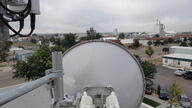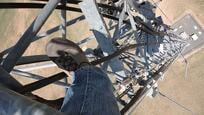As part of the US Government Shut Down, the FCC has shut down its operations. The shut down of the FCC stops all functions to include the processing of new licensed microwave backhaul or other point to point wireless backhaul governed by the FCC and any renewal of existing licensed wireless backhauls that are expiring. The FCC took time to shutdown their web site not allowing anyone to view their current FCC licensed wireless networks, to view any open applications, file any new or renewal applications, or to even do any research at all about wireless communications (which includes both licensed microwave and rules on unlicensed wireless backhaul). The only exception according to the FCC website is limited to immediate actions that involve safety of life or the protection of property.
From the FCC.gov web site: “We regret the disruption, but during the Federal Government-wide shutdown, the FCC is limited to performing duties that are immediately necessary for the safety of life or the protection of property. FCC online systems will not be available until further notice.”
So what happens to the wireless industry that is in full swing with the growth of LTE, WiMax backhaul, and both public and private outdoor licensed wireless backhaul? Work already under way will still continue but no new projects that entail the use of new licensed point to point wireless backhaul, licensed WiMax, Two-Way radio, or other licensed microwave wireless communications can move forward with wireless installation until the FCC reopens and starts processing new and current licensed wireless applications. The bigger question is when they finally do return to work how much backlog will there be and how long will it take to get back on track?
The shut down and the inability to even do frequency coordination searches affect the entire population. Wireless backhaul is used for point to point wireless backhaul, including unlicensed wireless Ethernet bridges and licensed microwave backhaul, and point to multipoint systems, such as: LTE and WiMax backhaul. It also effect public safety for first responders with the use of two-way radio communications. Basically all new wireless network installations that require a licensed frequency have come to a halt.
Without wireless backhaul outdoor wireless networks that require either serial or Ethernet connectivity and bandwidth are not there. Wireless backhaul is used by all sorts of organizations and in all vertical markets for providing necessary serial and IP bandwidth in backhaul and last mile wireless applications. Many wireless backhaul networks use licensed microwave or other point to point wireless links. Licensed microwave backhaul is a popular choice for creating reliable wireless over unlicensed point to point wireless Ehternet bridge solutions due to potential wireless interference (see: http://www.aowireless.com/blog/bid/42478/Understanding-Microwave-Communication-Frequencies, http://www.aowireless.com/blog/bid/38494/Licensed-Microwave-Wireless-Backhaul, and http://www.aowireless.com/blog/bid/38658/Wireless-Interference-The-Effect-on-Unlicensed-Wireless-Backhaul for further information).
Government agencies, schools and other education facilities, healthcare, utilities, agricultural, both private and public enterprise, etc. all use wireless backhaul all the time. Many use outdoor wireless bridges for data and voice networks. Utilities use wireless backhaul both unlicensed wireless Ethernet bridges and licensed microwave point to point wireless backhaul for SCADA telemetry and Smart Grid applications (see: http://www.aowireless.com/blog/bid/92811/Wireless-Backhaul-for-the-Smart-Grid). Healthcare uses outdoor wireless as much as they use indoor wireless, like Wi-Fi, to provide critical networks between facilities. Wireless backhaul is also used for video surveillance applications for public safety and physical security. When the FCC stops the progression of the build out of licensed wireless networks the ability to provide high-speed wireless connectivity stops.
Not only does the shutdown impact the wireless installation of new backhaul networks but here is also a financial impact to all those that work in the wireless installation industry. This includes hundreds of manufactures, value added resellers, tower construction companies and tower climbers, and wireless integration companies. Many of which are small businesses. How much financial impact does it cause on a small business that performs wireless sales and wireless installation? It can be hundreds of thousands of dollars a week. The financial and production impact to the end users of the wireless backhaul networks can be in the millions of dollars.
Once the FCC reopens for business there will be a massive amount of backlog applications for wireless spectrum that will need to be caught up. Prior to the shutdown the FCC has been doing a good job of processing applications as fast as possible. But with the backlog they will be facing it can delay applications and processing months. Meanwhile the wireless installation industry has to delay projects. Wireless integrators and installers and wireless manufacturers will also have to shift gears in to high-speed mode to get their projects back on track.






